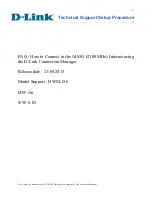
S e n d d o c u m e n t a t i o n c o m m e n t s t o m d s f e e d b a c k - d o c @ c i s c o . c o m
22-5
Cisco MDS 9000 Family CLI Configuration Guide
OL-16184-01, Cisco MDS SAN-OS Release 3.x
Chapter 22 Configuring Inter-VSAN Routing
Inter-VSAN Routing
IVR NAT
Without Network Address Translation (NAT), IVR requires unique domain IDs for all switches in the
fabric. You can enable IVR NAT to allow non-unique domain IDs. This feature simplifies the deployment
of IVR in an existing fabric where non-unique domain IDs might be present.
To use IVR NAT, it must be enabled in all IVR-enabled switches in the fabric IVR configuration
distribution (see the
“Distributing the IVR Configuration using CFS” section on page 22-10
). By default,
IVR NAT and IVR configuration distribution are disabled in all switches in the Cisco MDS 9000 Family.
IVR NAT Requirements and Guidelines
Following are requirements and guidelines for using IVR NAT:
•
For IVR NAT to function correctly in the network, all IVR-enabled switches must run Cisco MDS
SAN-OS Release 2.1(1a) or later.
•
IVR NAT port login (PLOGI) requests received from hosts are delayed a few seconds to perform the
rewrite on the FC ID address. If the host's PLOGI timeout value is set to a value less than five
seconds, it may result in the PLOGI being unnecessarily aborted and the host being unable to access
the target. We recommend that you configure the host bus adapter for a timeout of at least ten
seconds (most HBAs default to a value of 10 or 20 seconds).
•
Load balancing of IVR NAT traffic across equal cost paths from an IVR-enabled switch is not
supported. However, load balancing of IVR NAT traffic over PortChannel links is supported. The
load balancing algorithm for IVR NAT traffic over port-channel with Generation 1 linecards is
SRC/DST only. Generation 2 linecards support SRC/DST/OXID based load balancing of IVR NAT
traffic across a port-channel.
•
You cannot configure IVR NAT and preferred Fibre Channel routes on Generation 1 module
interfaces.
IVR NAT allows you to set up IVR in a fabric without needing unique domain IDs on every switch in
the IVR path. IVR NAT virtualizes the switches in other VSANs by using local VSAN for the destination
IDs in the Fibre Channel headers. In some Extended Link Service message types, the destinations IDs
are part of the payload. In these cases, IVR NAT replaces the actual destination ID with the virtualized
destination ID. IVR NAT supports destination ID replacement in the Extended Link Service messages
described in
Table 22-2
.
Table 22-2
Extended Link Service Messages Supported by IVR NAT
Extended Link Service Messages
Link Service Command
(LS_COMMAND)
Mnemonic
Abort Exchange
0x06 00 00 00
ABTX
Discover Address
0x52 00 00 00
ADISC
Discover Address Accept
0x02 00 00 00
ADISC ACC
Fibre Channel Address Resolution Protocol
Reply
0x55 00 00 00
FARP-REPLY
Fibre Channel Address Resolution Protocol
Request
0x54 00 00 00
FARP-REQ
Logout
0x05 00 00 00
LOGO
Port Login
0x30 00 00 00
PLOGI
















































